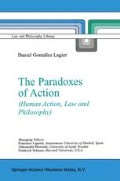Abstract
A quick review of the theories of action we have seen in Chapters III and IV, advocated by philosophers and by criminal lawyers, respectively, will reveal parallels between them. Here, instead of explaining more about them in so many words, I will simply present them in the following table (where in the right-hand column, corresponding to criminal law, I will additionally indicate in brackets the equivalent approaches in Anglo-Saxon law):

Access this chapter
Tax calculation will be finalised at checkout
Purchases are for personal use only
Preview
Unable to display preview. Download preview PDF.
References
Cf. sect. 1.1.2 of Chapter III.
Cf. sects. 2.1 and 3.1 of Chapter IV.
Cf. sect. 2 of Chapter III and sect. 2.2 of Chapter IV.
Cf. sect. 3 of Chapter III and sect. 2.4 of Chapter IV.
On power-conferring rules, cf. Atienza/Ruiz Manero 1998.
Cf. sect. 5.4 of Chapter IV.
Cf. sect. 6 of Chapter VII.
Cruz 1990, p. 110.
Cf. Chapter VII, Sect. 6.3.
Feinberg 1968, pp. 111 ff. As we have seen in Chapter III, Sect. 3, Feinberg adds that the ascription of an action is performed in order to attribute responsibility (in the widest sense, including merely causal responsibility which does not necessarily imply blame); but we do not need to include this feature here, because he stretches the meaning of ‘responsibility’ too far. For the present context, it is enough to say that when an action is ascribed to someone, this is normally done with some purpose (which must not necessarily be that of blaming or praising).
In the sense spelled out in Chapter I, sect. 4.
Nino 1972, p. 37.
Davidson 1980b, p. 113.
Davidson 1980c, p. 180.
Cf. González Lagier 1997.
Cf. sect. 6.3 of Chapter VII.
Author information
Authors and Affiliations
Rights and permissions
Copyright information
© 2003 Springer Science+Business Media Dordrecht
About this chapter
Cite this chapter
Lagier, D.G. (2003). The Paradoxes Dissolved. In: The Paradoxes of Action. Law and Philosophy Library, vol 67. Springer, Dordrecht. https://doi.org/10.1007/978-94-017-0205-8_6
Download citation
DOI: https://doi.org/10.1007/978-94-017-0205-8_6
Publisher Name: Springer, Dordrecht
Print ISBN: 978-90-481-6443-1
Online ISBN: 978-94-017-0205-8
eBook Packages: Springer Book Archive

